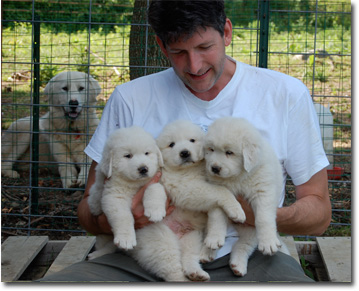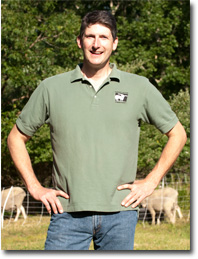A Meaningful Life on the “Other Side”: Patrick Manning ’86
At first glance, former New York State assemblyman and 1986 Vassar grad Patrick Manning’s life in “retirement” seems almost slow and peaceful. At his farmhouse in Hopewell Junction, New York, a padded hammock graces the back porch and several chickens cluck under foot; his property hosts acres of woods, a waterfall, a pond, and a neatly tended garden. The outside of the lime-green farmhouse needs work—there’s chipping paint, a broken window pane, and a slightly askew electric lantern at the entrance—but if you peek through a window, it looks well loved and lived in. A jumble of sneakers by the door, baskets of brightly colored skeins of yarn, a pair of jeans hanging to dry over a wooden room divider.
It seems an idyllic retreat, a place to simply sit and listen to the wind in the trees. But look a little bit closer: while the farmhouse, which his grandfather bought in 1924, is showing its age, the hammock on the back porch looks suspiciously new… and unused.
“My mother and father worked so hard and were so driven when I was younger. It must have rubbed off on me,” says Manning, who admits he has trouble sitting still.
“I get bored easily,” he adds. “I want to change things.”
These days Manning has a “hand and both legs” in several different endeavors. He is the executive director of a housing nonprofit on Martha’s Vineyard; he leaves Hopewell Junction at 3:15 a.m. every Monday to be on the job by 9:00 a.m. He is co-owner of Hudson Valley Fiber Farm and Martha’s Vineyard Fiber Farm, home to a variety of goats and sheep. And he is cofounder and board member of Hudson Valley Fresh, a nonprofit cooperative dedicated to preserving the agricultural heritage of the Hudson Valley and securing living wages for farmers and their families.
Elizabeth Crothers, Manning’s former chief of staff, said agriculture and land conservation have always been a focus for Manning.
“Rather than simply urging others to do things, Pat likes to be active himself,” Crothers said. “His passion for sustainable agriculture is an example of that: he not only worked on initiatives in the legislature and built local coalitions that would support local farmers, he worked to become part of the movement itself.”

At Vassar, Manning majored in political science, took every drama class he could, and participated in a protest or two.
“My father opened up the Poughkeepsie Journal one day to see a picture of us closing down Main Gate [to protest Apartheid],” he said.
Two years after graduation Manning ran as a Republican for a seat on the Dutchess County legislature. When he ran for the New York State assembly three years later, he became the youngest state assemblyman ever elected. Manning served 15 years at the state level, and at one point threw in his hat to be New York State governor. He ended up pulling out of the governor’s race, and in 2006 he lost his assembly seat by a margin of a little over 200 votes.
One of his most important contributions while in the state legislature, according to Crothers, was to stand in opposition to a 1,500-acre cement plant proposed for the banks of the Hudson River. When the proposal for the plant was defeated, environmental groups were thrilled; his Republican colleagues apparently were not. In the following election they put a primary opponent against him and denied him the party line.

“I was ready to retire, but I didn’t realize it,” Manning said of losing the election. “Elected officials get wrapped up in constantly running for office. They often don’t realize it’s better on the other side of the fence.”
More and more, Manning’s time on the other side is spent tending to flocks of sheep and goats, and running the growing fiber business with business partner Susan Gibbs, a former CBS News producer. Gibbs and Manning devoured stacks of do-it-yourself farming books before jumping in. It wasn’t until they began offering shares — creating a yarn and fiber CSA (community-supported agriculture) — that the business took off.
A system used primarily by produce growers, a CSA sells shares in its harvest. This year Manning and Gibbs sold 826 shares to people in 48 states. Shareholders receive weekly farm updates, an invitation to a shearing day celebration, and skeins of beautiful yarn produced from animals humanely raised in organic pastures. The fall harvest this year was kid mohair; Manning and Gibbs hired a small, family-owned mill to blend the fiber for a fine wool/kid mohair yarn.
“For not much more money,” Manning says of CSAs, “you can have a great product and also help save thousands of acres of open spaces.”
Full of ideas, Manning said he would like his next endeavor to be a nonprofit dedicated to helping both young and old enjoy and profit from farming. A book about farming, written by Manning and Gibbs, is scheduled to be published by Chelsea Green this fall.
— Rebecca Hyde ’92
Photo cedits: Susan Gibbs; Nicolor Friedler Photography
Have comments about this article? Email vq@vassar.edu
